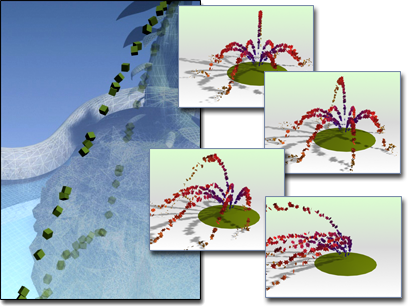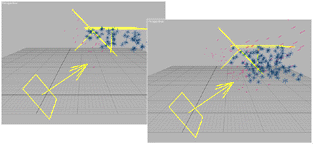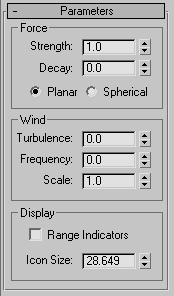The Wind space warp simulates the effect of wind blowing particles generated by a particle system. Wind is directional. Particles moving in the direction of the wind arrow accelerate. Particles moving against the arrow decelerate. In the case of spherical wind, motion is toward or away from the icon.

Wind changing the direction of the spray of a fountain
Wind is similar in effect to the Gravity space warp, but has added parameters for turbulence and other features characteristic of wind in the natural world.

Wind effect on snow and spray
Procedures
To create wind:
- On the
 Create panel, click
Create panel, click  (Space Warps). Choose Forces from the list, then on the Object Type rollout, click Wind.
(Space Warps). Choose Forces from the list, then on the Object Type rollout, click Wind. - Drag in a viewport.
The wind icon appears. For planar wind (the default), the icon is a wireframe square with a direction arrow coming out of one side. For spherical wind, the icon is a wireframe sphere.
The initial direction of planar wind is along the negative Z axis of the construction grid that is active in the viewport where you drag. You can rotate the wind object to change the direction.
Interface

Force group
These settings are comparable to the Gravity parameters.
- Strength
- Increasing Strength increases the wind effect. Strength less than 0.0 creates a suction. It repels particles moving in the same direction and attracts particles moving in the opposite direction. When Strength is 0.0, the Wind warp has no effect.
- Decay
- When Decay is set to 0.0, the Wind warp has the same strength throughout world space. Increasing the Decay value causes wind strength to diminish as distance increases from the position of the Wind warp object. Default=0.0.
- Planar Wind effect is perpendicular to the plane of the Wind warp object, throughout the scene.
- Spherical Wind effect is spherical, centered on the Wind warp object.
Wind group
These settings are specific to the Wind space warp.
- Turbulence
-
Causes particles to change course randomly as the wind blows them. The greater the value, the greater the turbulence effect.
- Frequency
-
When set greater than 0.0, causes turbulence to vary periodically over time. This subtle effect is probably not visible unless your bound particle system generates a large number of particles.
- Scale
-
Scales the turbulence effect. When Scale is small, turbulence is smoother and more regular. As Scale increases, turbulence grows more irregular and wild.
Display group
- Range Indicators
-
When the Decay value is greater than zero, icons appear in the viewports that represent the range at which the force of wind is half the maximum value. When you use the Planar option, the indicators are two planes; when you use the Spherical option, the indicator is a double-hooped sphere.
- Icon Size
-
Size of the Wind warp object icon, in active units. You set the initial Icon Size value when you drag to create the wind object. This value does not change the wind effect.